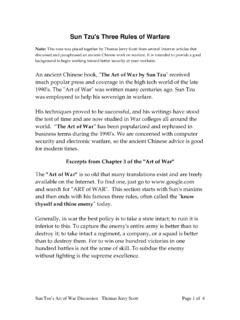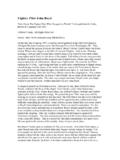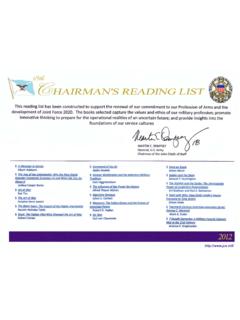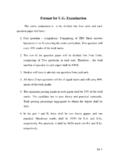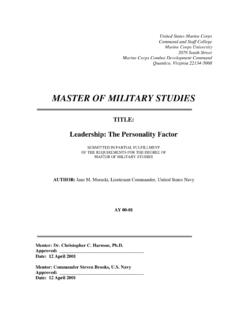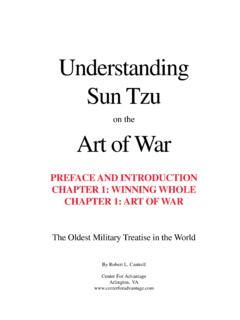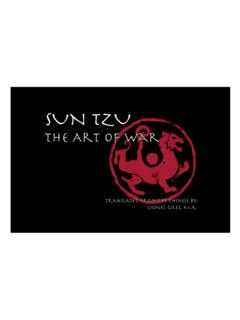Transcription of The Art of War - Puppet Press
1 the art of war by Sun TzuTTThhheee AAArrrttt ooofff WWWaaarrrSSSuuunnn TTTzzzuuuThe Oldest Military Treatise in the WorldTranslated from the Chinese,with an Introduction and Critical NotesbyLionel Giles, of Oriental Printed BooksAnd ManuscriptsBritish Museum1910 the art of war by Sun TzuTo my brotherCaptain Valentine Giles, the hope thata work 2400 years oldmay yet contain lessonsworth considerationby the soldier of todaythis translationis affectionately dedicated. A Puppet Press ClassicThe Art of War by Sun TzuIntroduction------------------------- ------------------------------------5 Sun Wu and His Book------------------------------------ --------------5 The Text of Sun Tzu------------------------------------- -------------17 The Commentators---------------------------- ------------------------20 Appreciations of Sun Tzu------------------------------------- --------24 Apologies for War------------------------------------- ---------------25 Bibliography---------------------------- ------------------------------29 Footnotes------------------------------- -------------------------------31 the art of war ------------------------------------- --------------------35I.
2 Laying Plans----------------------------------- --------------------35II. Waging War------------------------------------- ------------------41 III. Attack by Strategem------------------------------- ---------------46IV. Tactical Disposiitons---------------------------- ------------------53V. Energy---------------------------------- ---------------------------58VI. Weak Points and Strong---------------------------------- ---------65 VII. Maneuvering----------------------------- ------------------------74 VIII. Variations in Tactics--------------------------------- ----------85IX. The Army on the March----------------------------------- ------92X. Terrain--------------------------------- --------------------------106XI. The Nine Situations------------------------------ ---------------115 XII. The Attack by Fire------------------------------------ ----------143 XIII. The Use of Spies----------------------------------- ------------150 the art of war by Sun TzuThe Art of War was virtually unknown inEurope until 1782, when a French Jesuitpriest living in China, Joseph Amiot, acquired a copy and translated it intoFrench.
3 It was not a good translation because, Dr. Giles wrote, "[I]tcontains a great deal that Sun Tzu did not write, and very little indeed ofwhat he did."Capt. E. F. Calthrop, , published the first English translation in1905 in Tokyo. Dr. Giles said this translation was, "excessively bad " and!It is not merely a question of downright blunders, from which nonecan hope to be wholly exempt. Omissions were frequent; hard passageswere willfully distorted or slurred over. Such offenses are less would not be tolerated in any edition of a Latin or Greek classic, anda similar standard of honesty ought to be insisted upon in translationsfrom Chinese."In 1908, a new edition of Captain Calthrop's translation waspublished in London. It was an improvement " omissions filled up andnumerous mistakes corrected " but new errors were created in Giles wrote about his own translation: "It was not undertakenout of any inflated estimate of my own powers; but I could not help feelingthat Sun Tzu deserved a better fate than had befallen him, and I knewthat, at any rate, I could hardly fail to improve on the work of mypredecessors.
4 "Dr. Giles was a leading Sinologist and an assistant in theDepartment of Oriental Printed Books and Manuscripts in the Tzu'sThe Puppet Press Art of War by Sun Tzu 5 IInnttrroodduuccttiioonnSun Wu and His BookSsu-ma Ch`ien gives the following biography of Sun Tzu: [1]:Sun Tzu Wu was a native of the Ch`i State. His Art of War broughthim to the notice of Ho Lu, [2] King of Wu. Ho Lu said to him: "I havecarefully perused your 13 chapters. May I submit your theory of managingsoldiers to a slight test?"Sun Tzu replied: "You may."Ho Lu asked: "May the test be applied to women?"The answer was again in the affirmative, so arrangements weremade to bring 180 ladies out of the Palace. Sun Tzu divided them into twocompanies, and placed one of the King#s favorite concubines at the headof each. He then bade them all take spears in their hands, and addressedthem thus: "I presume you know the difference between front and back,right hand and left hand?
5 "The girls replied: Tzu went on: "When I say "Eyes front,$ you must look straightahead. When I say "Left turn," you must face towards your left I say "Right turn,$ you must face towards your right hand. When Isay "About turn,$ you must face right round towards your back."Again the girls assented. The words of command having been thusexplained, he set up the halberds and battle-axes in order to begin thedrill. Then, to the sound of drums, he gave the order "Right turn." But thegirls only burst out laughing. Sun Tzu said: "If words of command are notclear and distinct, if orders are not thoroughly understood, then thegeneral is to blame."So he started drilling them again, and this time gave the order "Leftturn," whereupon the girls once more burst into fits of laughter. Sun Tzu:"If words of command are not clear and distinct, if orders are notthoroughly understood, the general is to blame. But if his orders are clear,and the soldiers nevertheless disobey, then it is the fault of their officers.
6 "So saying, he ordered the leaders of the two companies to bebeheaded. Now the king of Wu was watching the scene from the top of araised pavilion; and when he saw that his favorite concubines were aboutto be executed, he was greatly alarmed and hurriedly sent down theThe Puppet Press Art of War by Sun Tzu 6following message: "We are now quite satisfied as to our general's abilityto handle troops. If We are bereft of these two concubines, our meat anddrink will lose their savor. It is our wish that they shall not be beheaded."Sun Tzu replied: "Having once received His Majesty's commissionto be the general of his forces, there are certain commands of His Majestywhich, acting in that capacity, I am unable to accept."Accordingly, he had the two leaders beheaded, and straightwayinstalled the pair next in order as leaders in their place. When this hadbeen done, the drum was sounded for the drill once more; and the girlswent through all the evolutions, turning to the right or to the left, marchingahead or wheeling back, kneeling or standing, with perfect accuracy andprecision, not venturing to utter a sound.
7 Then Sun Tzu sent a messengerto the King saying: "Your soldiers, Sire, are now properly drilled anddisciplined, and ready for your majesty's inspection. They can be put toany use that their sovereign may desire; bid them go through fire andwater, and they will not disobey."But the King replied: "Let our general cease drilling and return tocamp. As for us, We have no wish to come down and inspect the troops."Thereupon Sun Tzu said: "The King is only fond of words, andcannot translate them into deeds."After that, Ho Lu saw that Sun Tzu was one who knew how tohandle an army, and finally appointed him general. In the west, hedefeated the Ch`u State and forced his way into Ying, the capital; to thenorth he put fear into the States of Ch`i and Chin, and spread his fameabroad amongst the feudal princes. And Sun Tzu shared in the might ofthe Sun Tzu himself this is all that Ssu-ma Ch`ien has to tell usin this chapter. But he proceeds to give a biography of his descendant,Sun Pin, born about a hundred years after his famous ancestor's death,and also the outstanding military genius of his time.
8 The historian speaksof him too as Sun Tzu, and in his preface we read: "Sun Tzu had his feetcut off and yet continued to discuss the art of war ." [3] It seems likely,then, that "Pin" was a nickname bestowed on him after his mutilation,unless the story was invented in order to account for the name. Thecrowning incident of his career, the crushing defeat of his treacherous rivalP`ang Chuan, will be found briefly related in Chapter V. ss. 19, return to the elder Sun Tzu. He is mentioned in two otherpassages of the SHIH CHI:In the third year of his reign [512 ] Ho Lu, king ofWu, took the field with Tzu-hsu [ Wu Yuan] and Po P`ei,and attacked Ch`u. He captured the town of Shu and slewthe two prince's sons who had formerly been generals ofThe Puppet Press Art of War by Sun Tzu 7Wu. He was then meditating a descent on Ying [the capital];but the general Sun Wu said: "The army is exhausted.
9 It isnot yet possible. We must wait"[After further successfulfighting,] "in the ninth year [506 ], King Ho Lu addressedWu Tzu-hsu and Sun Wu, saying: "Formerly, you declaredthat it was not yet possible for us to enter Ying. Is the timeripe now?" The two men replied: "Ch`u's general Tzu-ch`ang, [4] is grasping and covetous, and the princes ofT`ang and Ts`ai both have a grudge against him. If YourMajesty has resolved to make a grand attack, you must winover T`ang and Ts`ai, and then you may succeed." Ho Lufollowed this advice, [beat Ch`u in five pitched battles andmarched into Ying.] [5]This is the latest date at which anything is recorded of Sun Wu. Hedoes not appear to have survived his patron, who died from the effects ofa wound in another chapter there occurs this passage: [6]From this time onward, a number of famous soldiersarose, one after the other: Kao-fan, [7] who was employedby the Chin State; Wang-tzu, [8] in the service of Ch`i; andSun Wu, in the service of Wu.
10 These men developed andthrew light upon the principles of is obvious enough that Ssu-ma Ch`ien at least had no doubtabout the reality of Sun Wu as an historical personage; and with oneexception, to be noticed presently, he is by far the most importantauthority on the period in question. It will not be necessary, therefore, tosay much of such a work as the WU YUEH CH`UN CH`IU, which issupposed to have been written by Chao Yeh of the 1st century Theattribution is somewhat doubtful; but even if it were otherwise, his accountwould be of little value, based as it is on the SHIH CHI and expanded withromantic details. The story of Sun Tzu will be found, for what it is worth, inchapter 2. The only new points in it worth noting are: (1) Sun Tzu was firstrecommended to Ho Lu by Wu Tzu-hsu. (2) He is called a native of Wu.(3) He had previously lived a retired life, and his contemporaries wereunaware of his following passage occurs in the Huai-nan Tzu: "Whensovereign and ministers show perversity of mind, it is impossible even fora Sun Tzu to encounter the foe.

